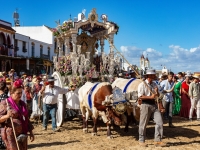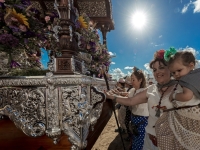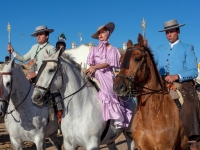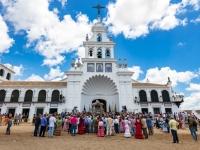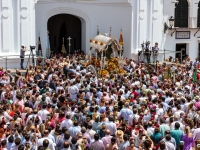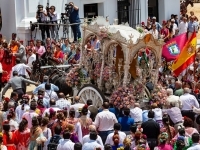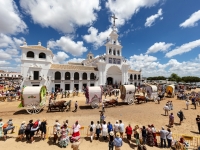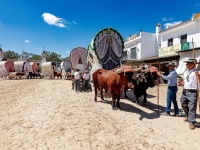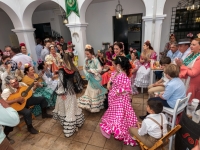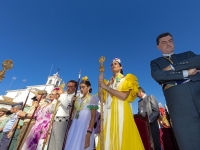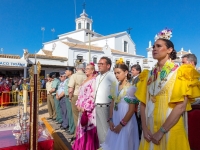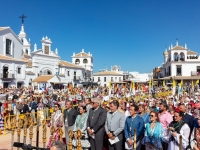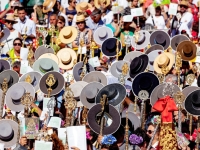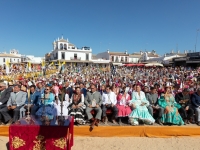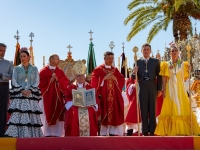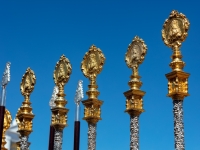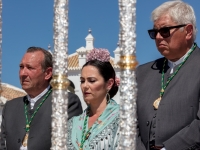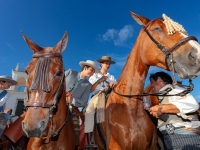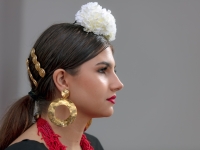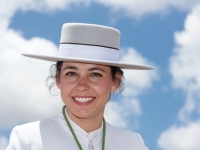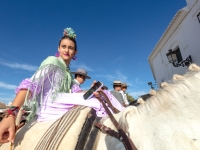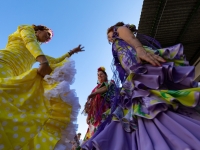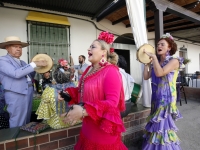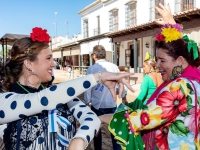Travel
Pilgrimage Romeria de El Rocío Andalusia Spain
The Romeria de El Rocío
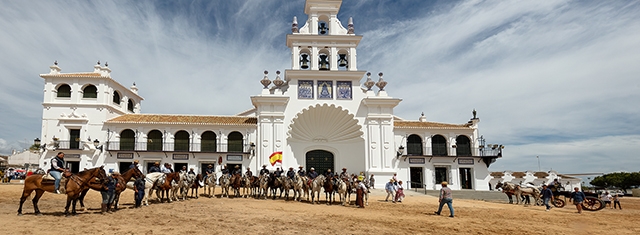
Pilgrimage Romeria de El Rocío Andalusia Spain (Source: Roberto Magni By Foto ReD Photographic Agency)
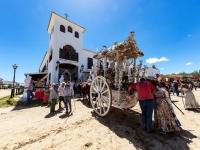
Pilgrimage Romeria de El Rocío Andalusia Spain
(Source: Roberto Magni By Foto ReD Photographic Agency)
(Source: Roberto Magni By Foto ReD Photographic Agency)
The hermitage houses the Virgin of El Rocío (Spanish Virgen del Rocio), a small very revered carved wooden statue.
The pilgrimage dates from 1653, when the Virgin of Las Rocinas was appointed patron saint of Almonte. Originally it took place on 8 September. Since 1758, the Virgin has been known as the Virgin of El Rocío, and the pilgrimage has taken place on the second day of Pentecost.
Every May, a small town in western Andalusia hosts a million people as they celebrate the Romeria del Rocio – Spain’s most traditional festival. The Romería del Rocío also includes a caravan of pilgrims from all over the country, who will walk from Almonte to the shrine of the Virgin of the Rosary to pay their respects.
They will carry statues of the Virgin and colorful flags along their journey and be accompanied by horse-drawn carriages, folk dances and lively music, is a wonderful opportunity to experience a rich cultural tradition and gain insight into the strong faith of the Spanish people.
The streets of Almonte and the surrounding countryside become a blur of lively activity, with people singing, dancing.
Its an opportunity for people to show their devotion to the Virgin del Rocío and celebrate the rich culture of the region.
A ritual with over 500 years of history, the Romería de El Rocío is rooted in the culture of the neighbouring Andalusian towns and is marked by its reverence for the Virgen del Rocío.
The pilgrimage is celebrated with horse carriages, floats and trucks lavishly decorated with flowers, banners and flags.
Along the way, riders and bullfighters on horseback accompany them to create a thundering celebration that features performances of music and dancing.
The pilgrimage culminates in the early hours of the morning when the procession arrives in El Rocío, a small village in the heart of the Doñana National Park.
So come witness the beauty and grandeur of the Romería de El Rocío and experience a unique part of Spanish culture and history.
The Romeria del Rocio pilgrimage is one of Andalusia’s oldest and largest celebrations and arguably Spain’s most traditional feria. Its roots can be traced back to the 13th century when, according to the popular story, a local hunter from the village of Villamanrique came upon a statue of the Virgin Mary in a hollowed-out tree trunk in Doñana national park (a must visit in its own right).
Spaniards travelling to El Rocio from elsewhere in Andalusia often make the journey in the same way as the pilgrims of three hundred years ago did.
Women wear the beautiful flamenco dresses – trajes de gitanas or gypsy dresses – similar to the ones they show off at the big ferias and men wear smart grey trousers, short riding jackets and wide-brimmed hats.
People start arriving into El Rocio on the Friday before Pentecost Monday, transforming the town from a sleepy idyll to a scene of endless processions, competitions and parties. Endless rocieras – songs about the pilgrimage that sound like flamenco – are sung around spitting, glowing campfires.
In the early hours of Pentecost Monday morning, the weekend’s partying reaches its finale and the statue of the El Rocio virgin (known as the White Dove) is brought out of her church and paraded around each chapel in town.
A ritual with over 500 years of history, the Romería de El Rocío is rooted in the culture of the neighbouring Andalusian towns and is marked by its reverence for the Virgen del Rocío.
The faithful come together in a large procession of pilgrims, led by horseback riders that zigzag toward the Hermandad del Rocío. This procession is accompanied by the sound of drums, singing, and traditional music. Once the procession reaches the Hermandad del Rocío, pilgrims celebrate and pray either in the chapel or outside in the sunshine. This is followed by four days of festivities, including parades of horse riders, traditional foods, and plenty of music and dancing.
Participants come from all over the province, dressed in traditional clothing and riding horseback in a show of pride and joy. The festivities take place over a week-long period and many visitors join in on the joyous parade to the town center, where the Virgin of El Rocío is venerated and celebrated. From lively dances in the streets to fireworks and concerts, the celebration of The Romería de El Rocío is a spectacle to behold.
In the early hours of Pentecost on Monday morning, the weekend feast reaches its end and the statue of the Virgin El Rocio (known as the white dove) is brought out of its church and brought in a parade around each chapel of the city. While doing the big tour of her, the different confraternities are loudly asking for the privilege of bringing her to the next chapel; The pilgrims go and push each other to touch the glass display case in which it is transported and the adults cry for the emotion while swaying and jumps.
Its an opportunity for visitors to fully immerse themselves in the culture and live the experience as authentically as possible, is an unforgettable display of pageantry and beauty set in the stunning backdrop of Andalusians picturesque landscapes.
Come join the festivities and experience the Romería de El Rocío for yourself. Witness the devotion and enthusiasm of the pilgrims and be part of the colorful celebration that has been alive for centuries. Its an unforgettable experience and one you wont soon forget.
Be captivated by traditional dress and dance, vibrant processions and the beauty of the natural landscape.
Come experience the sights, sounds and culture that make the Romería so special.
Its an opportunity for visitors to fully immerse themselves in the culture and live the experience as authentically as possible.
Witness the devotion and enthusiasm of the pilgrims and be part of the colorful celebration that has been alive for centuries.
Experience the joy of this unique and centuries-old celebration that is still celebrated today.
If you are looking for a truly unique experience, then the Romería del Rocío is a must-see event, immerse yourself in the magical atmosphere. Make sure to mark your calendar for the next Romería del Rocío and be part of an unforgettable Spanish tradition.
The photographic reportage and the texts of the Romería de El Rocío article were made by photographers and journalists Magni Roberto and Daniela Comi by Foto ReD Photographic Agency for their magazine "ReDMagazine"
more information: https://www.redmagazine.red
Liability for this article lies with the author, who also holds the copyright. Editorial content from USPA may be quoted on other websites as long as the quote comprises no more than 5% of the entire text, is marked as such and the source is named (via hyperlink).

